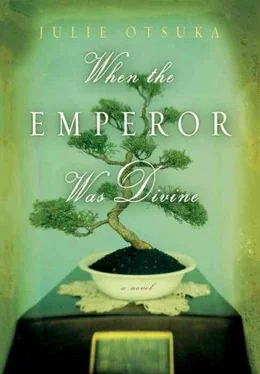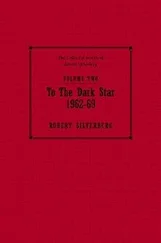Someone said, “Just say sayonara, Frank.”
Someone said, “Bon soir!”
Someone said, “Please shut up, please.”
Someone else belched.
There was a window above the boy’s bed, and outside were the stars and the moon and the endless rows of black barracks all lined up in the sand. In the distance, a wide empty field where nothing but sagebrush grew, then the fence and the high wooden towers. There was a guard in each tower, and he carried a machine gun and binoculars and at night he manned the searchlight. He had brown hair and green eyes, or maybe they were blue, and he had just come back from a tour of the Pacific.
ON THEIR FIRST DAY in the desert his mother had said, “Be careful.”
“Do not touch the barbed-wire fence,” she had said, “or talk to the guards in the towers.
“Do not stare at the sun.
“And remember, never say the Emperor’s name out loud.”
The boy wore a blue baseball cap and he did not stare at the sun. He often wandered the firebreak with his head down and his hands in his pockets, looking for seashells and old Indian arrowheads in the sand. Some days he saw rattlesnakes sleeping beneath the sagebrush. Some days he saw scorpions. Once he came across a horse skull bleached white by the sun. Another time, an old man in a red silk kimono with a tin pail in his hand who said he was going down to the river.
Whenever the boy walked past the shadow of a guard tower he pulled his cap down low over his head and tried not to say the word.
But sometimes it slipped out anyway.
Hirohito, Hirohito, Hirohito.
He said it quietly. Quickly. He whispered it.
ON THE TRAIN RIDE into the desert he had slept with his head in his sister’s lap and dreamed he was riding an enormous white horse by the sea. When he looked out toward the horizon he could see three black ships out on the water. The ships had sailed all the way over from the other side of the ocean. The Emperor himself had sent them. Their sails were white and square and filled with wind and their masts were straight and tall. He had watched as they slowly turned toward the shore. Then he was awake and the train was rocking from side to side and in the seat behind him a woman was quietly singing. It was dawn and his sister was sound asleep. She was wearing her yellow summer dress with the little white flowers because in the desert, where they were going, it would be summer a lot.
IT WAS NOT LIKE any desert he had read about in books. There were no palm trees here, no oases, no caravans of camels slowly winding across the dunes. There was only the wind and the dust and the hot burning sand.
In the afternoon the heat rose up from the ground in waves. The air above the barracks shimmered. It was ninety-five degrees out. One hundred. One hundred and ten. Old men sat outside on the long narrow benches, not talking, whittling away at pieces of wood as they waited for the hours to pass. The boy played marbles on the laundry room floor. He played Chinese checkers. He roamed through the barracks with the other boys in his block, playing cops and robbers and war. Kill the Nazis! Kill the Japs! On days when it was too hot to go out he sat in his room with a wet towel over his head and leafed through the pages of old Life magazines. He saw the bombed-out cities of Europe, and the Allied soldiers in Burma, fleeing to India through the hot steamy jungle. His sister lay on her cot for hours, staring, transfixed, at white majorette boots and men in their bathrobes in the Sears, Roebuck catalog. She wrote letters to her friends on the other side of the fence, telling them all she was having a good time. Wish you were here. Hope to hear from you soon. Their mother darned socks by the window. She read. She made them paper kites with tails woven out of potato sack strings. She took a flower-arranging class. She learned to crochet— “It’s something to do”—and for one week there were doilies under everything.
Mostly, though, they waited. For the mail. For the news. For the bells. For breakfast and lunch and dinner. For one day to be over and the next day to begin.
“When the war is over,” the boy’s mother told him, “we can pack up our things and go home.”
He asked her when she thought that might be. In a month maybe? Two months? A year, tops? She shook her head and looked out the window. Three young girls in dirty white frocks were playing ladies in the dust— “Oh, bother,” they cried out, and, “Hullo, have some tea?”—and in the distance there were ravens riding the updrafts. “There’s no telling,” she said.
ON THE OTHER SIDE of the wall by his bed lived a man and his wife and the wife’s elderly mother, Mrs. Kato, who talked to herself night and day. She wore a pink flowered housedress, and tiny white slippers, and she carried a cane, and in the evening, after supper, the boy often saw her standing in her doorway with a small wicker suitcase, trying to remember the way home. Did she go left on Ward and then right on Grove? Or was it right on Ward and left on Grove? And when had they taken down all the street signs, anyway? Whose bright idea was that ? Should she continue to wait for the bus? Or should she just start walking? And when she finally got there, then what?
“The daffodils,” the boy called out to her softly.
“Oh yes, of course. I must remember to plant the daffodils. And the fence still needs mending.”
She said she could hear her mother calling for her in the distance, but that lately her voice had begun to sound farther and farther away.
“I guess that’s to be expected,” she said.
She said, “Oh, well,” and, “So it goes.”
She said, “There’s something strange about this place, but I can’t figure out what it is.”
She said, “Everyone here seems so serious.”
THE MAN SCRUBBING pots and pans in the mess hall had once been the sales manager of an import-export company in San Francisco. The janitor had owned a small nursery in El Cerrito. The cook had always been a cook. A kitchen’s a kitchen, it’s all the same to me. The waitress had worked as a live-in domestic for a wealthy family in Atherton. The children still write to me every week asking me when I’m going to come home. The man standing in front of the latrines shouting out, “Hallelujah, Hallelujah,” had been a vagrant on the streets of Oakland. That’s him! The Hallelujah guy! The old woman who did nothing but play bingo all day long had worked in the strawberry fields of Mt. Eden for twenty-five years without taking a single vacation. Me happy, come here. Better than Mt. Eden. No cook, no work, just do laundry fine.
One evening as the boy’s mother was hauling back a bucket of water from the washroom she ran into her former housekeeper, Mrs. Ueno. “When she saw me she grabbed the bucket right out of my hands and insisted upon carrying it home for me. ‘You’ll hurt your back again,’ she said. I tried to tell her that she no longer worked for me. ‘Mrs. Ueno,’ I said, ‘here we’re all equals,’ but of course she wouldn’t listen. When we got back to the barracks she set the bucket down by the front door and then she bowed and hurried off into the darkness. I didn’t even get a chance to thank her.”
“Maybe you can thank her tomorrow,” said the boy.
“I don’t even know where she lives. I don’t even know what day it is.”
“It’s Tuesday, Mama.”
AT NIGHT he woke up crying out, “Where am I?” Sometimes he felt a hand on his shoulder and it was his sister telling him it was all just a bad dream. “Go back to sleep, baby,” she’d whisper, and he would. Sometimes there was no answer. Sometimes he heard the wind blowing through the sagebrush and he remembered he was in the desert but he could not remember how long he had been there, or why. Sometimes he worried he was there because he’d done something horribly, terribly wrong. But then when he tried to remember what that horrible, terrible thing might be, it would not come to him. It could be anything. Something he’d done yesterday—chewing the eraser off his sister’s pencil before putting it back in the pencil jar—or something he’d done a long time ago that was just now catching up with him. Breaking a chain letter from Juneau, Alaska. Flushing his dying pet goldfish down the toilet before it was completely dead. Forgetting to touch the hat rack three times when the iceman drove by. Sometimes he thought he was dreaming, and he was sure that when he woke up his father would be downstairs in the kitchen whistling “Begin the Beguine” through his teeth as he fried up breakfast in the skillet. “Here it comes, champ,” his father would say, “one hobo egg sandwich.”
Читать дальше












